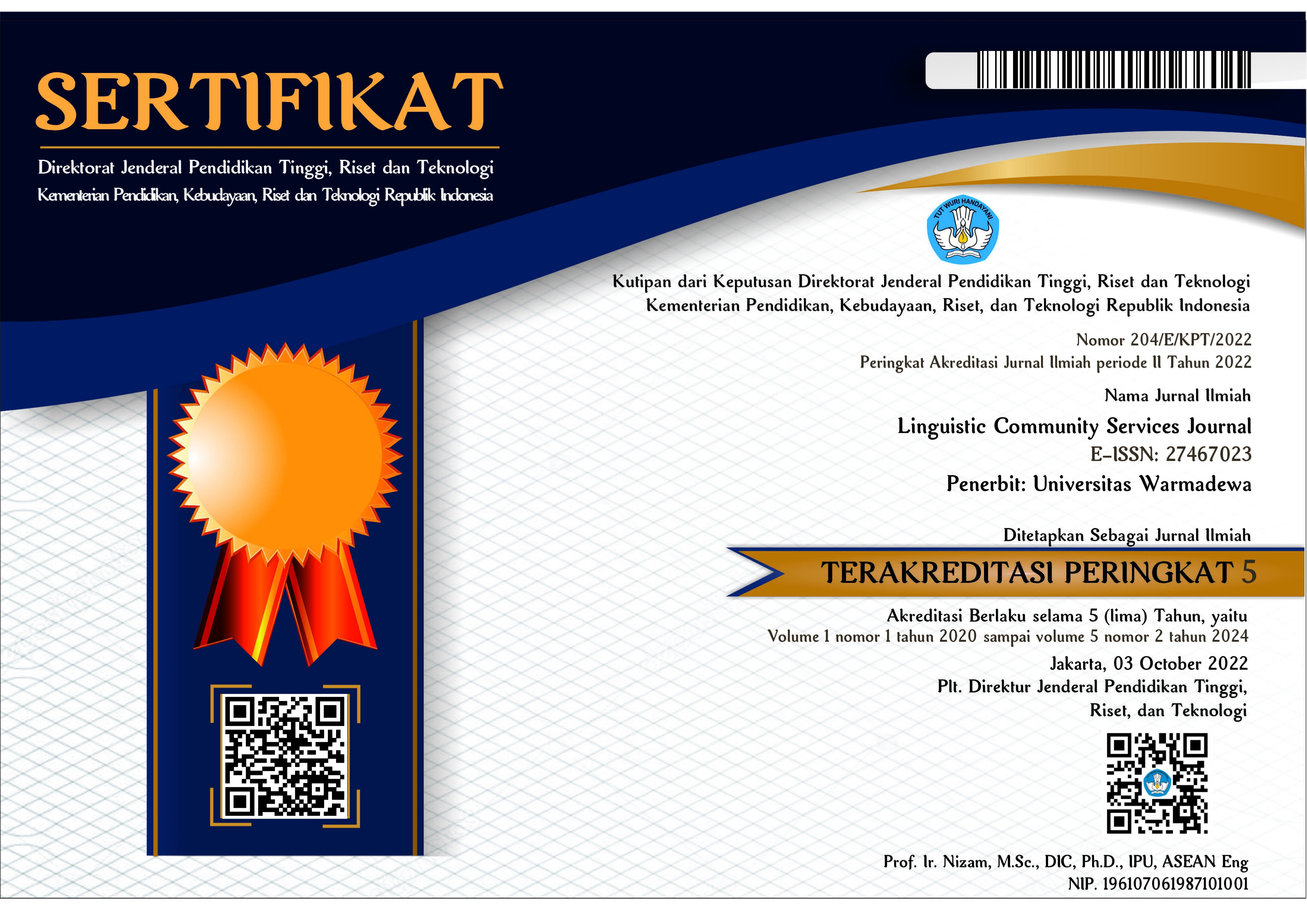ELT Solutions: Marketing Strategies for Effective Language Teaching and Education Management
Abstract
Community service research in English Language Teaching (ELT) is instrumental in evolving language education and refining management strategies. This research aims 1) to conduct a comprehensive assessment of the current landscape of language education, 2) to identify the diverse needs and preferences of language learners across various demographics, and 3) to develop marketing approaches that foster inclusivity in language education. The research methodology leverages the Zoom platform, offering a versatile virtual environment for stakeholder consultations, remote workshops, training sessions, and community engagement. The integration of Zoom proves effective in maintaining consistent communication, monitoring progress, and gathering real-time insights from diverse perspectives. The results of the community service activities are impactful, achieving a comprehensive assessment of the current language education landscape, identification of diverse learner needs, and the development of inclusive marketing approaches. The virtual nature of Zoom workshops facilitates the dissemination of inclusive strategies, contributing to a collaborative and supportive community within language education. In conclusion, ELT Solutions’ community service research, guided by innovative marketing strategies and facilitated by Zoom, significantly contributes to the improvement of language instruction, identification of diverse learner needs, and the development of inclusive practices. As a beacon for ongoing evolution in language education, this research positively impacts global language proficiency and intercultural communication skills, emphasizing the importance of adaptability in effective language teaching and education management.
References
Bralow, L. M., J, S. G., Cloyd, T., Makker, T., Zaidi, S., & Bandzar, S. (2020). The lifelong learning initiative: An innovative adult learning curriculum for subinterns. Academic Emergency Medicine, 27(Supplement 1), S318. http://ovidsp.ovid.com/ovidweb.cgi?T=JS&PAGE=reference&D=emed21&NEWS=N&AN=632418412
Dauenhauer, J. A., Heffernan, K. M., & Cesnales, N. I. (2018). Promoting intergenerational learning in higher education: older adult perspectives on course auditing. Educational Gerontology, 44(11), 732–740. https://doi.org/10.1080/03601277.2018.1555358
Ghimire, N. B. (2019). Five Facets for Effective English Language Teaching. Journal of NELTA Gandaki, 2, 65–73. https://doi.org/10.3126/jong.v2i0.26604
Ian O’Byrne, W., Schenke, K., Willisiii, J. E., & Hickey, D. T. (2015). Digital badges: Recognizing, assessing, and motivating learners in and out of school contexts. Journal of Adolescent and Adult Literacy, 58(6), 451–454. https://doi.org/10.1002/jaal.381
Tursunovich, R. I. (2022). Guidelines For Designing Effective Language Teaching Materials. American Journal of Research in Humanities and Social Sciences, 7, 65–70. www.americanjournal.org
Uysal, D. (2022). Problems and Solutions concerning English Language Preparatory Curriculum at Higher Education in View of ELT Instructors. International Journal of Contemporary Educational Research, 6(2), 452–467. https://doi.org/10.33200/ijcer.635093
Copyright (c) 2024 Linguistic Community Services Journal

This work is licensed under a Creative Commons Attribution-ShareAlike 4.0 International License.
This journal provides immediate open access to its content on the principle that making research freely available to the public supports a greater global exchange of knowledge.
All articles published Open Access will be immediately and permanently free for everyone to read and download. We are continuously working with our author communities to select the best choice of license options, currently being defined for this journal as follows: Creative Commons-Non Ceomercial-Attribution-ShareAlike (CC BY-NC-SA)
 Abstract viewed = 49 times
Abstract viewed = 49 times
 PDF downloaded = 37 times
PDF downloaded = 37 times













